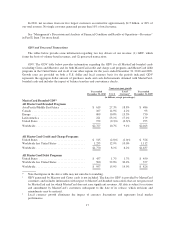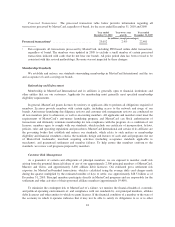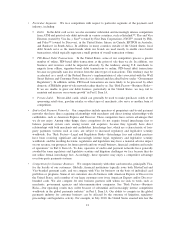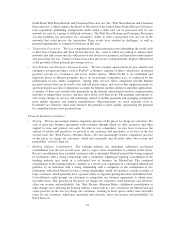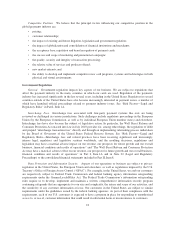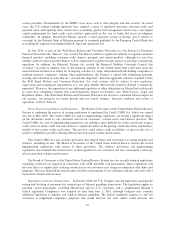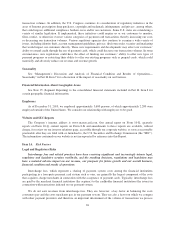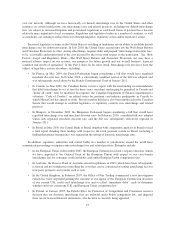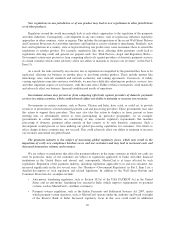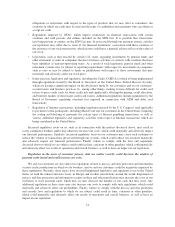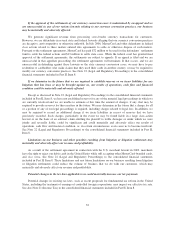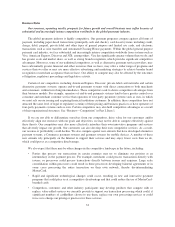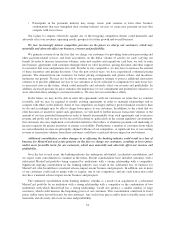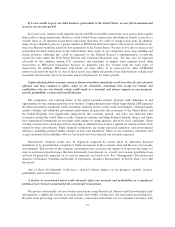MasterCard 2010 Annual Report Download - page 37
Download and view the complete annual report
Please find page 37 of the 2010 MasterCard annual report below. You can navigate through the pages in the report by either clicking on the pages listed below, or by using the keyword search tool below to find specific information within the annual report.over our network. Although we have historically set default interchange fees in the United States and other
countries, in certain jurisdictions, our interchange rates and related practices, including our default interchange
fees, are subject to increased litigation and government regulation as card-based forms of payment have become
relatively more important to local economies. Regulators and legislative bodies in a number of countries, as well
as merchants, are seeking to reduce these fees through litigation, regulatory action and/or legislative action.
Increased legislative scrutiny in the United States is resulting in limitations on our ability to establish default
interchange rates for debit transactions. In July 2010, the United States enacted into law the Wall Street Reform
and Consumer Protection Act that, among other things, requires debit and prepaid “interchange transaction fees”
to be “reasonable and proportional to the cost incurred by the issuer with respect to the transaction.” See “Risk
Factors—Legal and Regulatory Risks—The Wall Street Reform and Consumer Protection Act may have a
material adverse impact on our revenue, our prospects for future growth and our overall business, financial
condition and results of operations” in this Part I, Item 1A for more detail. Interchange fees also have been the
subject of legislative activity elsewhere, including:
• In France, in May 2009, the French Parliament began considering a bill that would have regulated
merchant discount fees. In October 2010, a substantially modified version of the bill was adopted, and
was subsequently struck down by the French Constitutional Court in January 2011.
• In Canada, in June 2009, the Canadian Senate issued a report with the non-binding recommendations
that debit interchange be set at zero for three years, merchant surcharging be permitted in Canada and
“honor all cards” rules be modified. In response, the Canadian Department of Finance implemented a
voluntary “Code of Conduct” on related issues for payment card industry participants in Canada, to
which MasterCard has agreed to abide. Private member bills have also been introduced in the Canadian
Senate that would attempt to establish legislative or regulatory controls over interchange and related
practices
• In Hungary, in December 2009, the Hungarian Parliament began considering a bill that would have
regulated interchange fees and merchant discount rates. In February 2010, a modified bill was adopted
which only regulated merchant discount rate, and the bill was subsequently effectively repealed in
January 2011.
• In Brazil, in May 2010, the Central Bank of Brazil (together with competition agencies in Brazil) issued
a final report detailing their findings with respect to the retail payment system in Brazil, including a
finding that greater transparency was required in the setting of domestic interchange rates.
In addition, regulatory authorities and central banks in a number of jurisdictions around the world have
commenced proceedings or inquiries into interchange fees and related practices. Examples include:
• In the European Union, in December 2007, the European Commission issued a negative decision (which
we have appealed to the General Court of the European Union) with respect to our cross-border
interchange fees for consumer credit and debit cards under European Union competition rules.
• In Australia, the Reserve Bank of Australia enacted regulations in 2002 (which have been subsequently
reviewed and not withdrawn) controlling the costs that can be considered in setting interchange fees for
four-party payment card systems such as ours.
• In the United Kingdom, in February 2007, the Office of Fair Trading commenced a new investigation
(which has been suspended pending the outcome of our appeal of the European Commission decision)
of our current U.K. credit card interchange fees and so-called “immediate debit” cards to determine
whether such fees contravene U.K. and European Union competition law.
• In Poland, in January 2007, the Polish Office for Protection of Competition and Consumers issued a
decision that our domestic interchange fees are unlawful under Polish competition law, and imposed
fines on our licensed financial institutions—the decision is currently being appealed.
27


